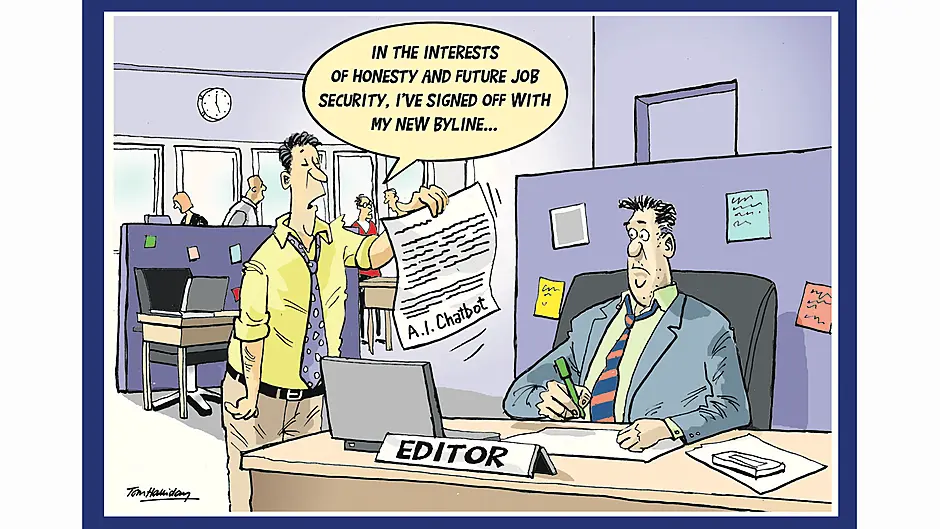
IT wasn’t fake news but fake tan news that made headlines this week when a prankster, or an activist, or who knows, maybe even a journalist, caused a furore amongst the chattering classes by submit- ting an article to The Irish Times website that was not what it purported to be.
It was post-truth, Jim, but not as we know it. Dare we call it post-post-truth?
The published article was an opinion piece titled ‘Irish women’s obsession with fake tan is problematic’ and was written by Adriana Acosta Cortez, described as a 29-year- old healthcare administrator living in Dublin. Except it wasn’t. It was written by an AI chatbot and submitted under false pretences by some smartarse.
The problem is that nobody really noticed, including the smart people working in the newspaper, and relatively smart readers like me, and there followed an embarrassing retraction and an apology by the editor.
We’ve known for years that AI was destined to redefine the workplace with fears that widespread unemployment would follow as work previously the preserve of humans becomes fully automated. But the emerging technology has far deeper, creepier and potentially more destructive ramifications, should it be adopted without the proper duty of care, none of which seems to be in evidence from the tech firms who are in an arms race to get their versions out first.
These days, AI can potentially take a short snippet of audio from – for example, your voicemail – and create a very passable simulation of your speaking voice which it can use however it wants – to call your loved ones, find out your PIN number, destroy your reputation. The AI has become so advanced that I listened to a version of Radiohead’s Creep being sung by an AI Kurt Cobain on YouTube the other night. It was pretty convincing and will only get better.
Video deep fakes are next and the AI can already create extremely convincing videos of known celebrities using an archive of their existing work. Indeed, the latest writers’ strike in America has concerns over AI and intellectual property at its core. There’s an actor on Instagram doing a deep fake Tom Cruise which is entirely convincing. This is fine when it’s done satirically, perhaps, but what if fake Tom Cruise begins committing acts of violence on camera or goes on some racist tirade?
It goes way beyond deep fakes and impersonation. The AI has the ability to write code (or learn any language, basically) and it can already far surpass the best efforts of human coders. In the wrong hands, could it find security breaches at nuclear power plants, or bring national health systems to their knees? Of course it could.
And the potential for unsettling democracy is all too easy to imagine. TikTok is Chinese-owned, for instance, and by far the most popular social media network amongst young people in America. Imagine what would happen if the platform was suddenly flooded with a ‘skin’ that allowed users to convincingly appear as Joe Biden in the run- up to the next election? Chaos would ensue.
And because the technology uses deep learning, which even its inventors don’t fully understand, it is improving exponentially. Once the genie is out of the bottle, this thing is only going to become more and more sophisticated. By itself.
Obviously, there is miraculous potential, too. Huge leaps in diagnostic imaging and vaccine development, for example. Massive advances in nanotechnology could increase the capacity of solar cells and supercharge our journey to ‘net zero’. But before this technology is adopted wholesale across our existing systems and networks, we need strong regulators and a disciplined and morally-aligned tech sector to protect the interests of society.
With this in mind, many experts are calling for a six- month pause in further devel- opment to allow for the regu- lators to catch up.
The question is – can we really react quickly enough and stay ahead of an exponentially expanding technology? And would six months just allow the bad actors to get ahead?
But more importantly, if the AI is effortlessly stirring up the national conversation in the paper of record, what is the future for us poor salt- of-the-earth opinion columnists? Our big fat, clunky human fingers are hammering out words at a fraction of the speed the robots can. Will anyone think of us?
Our own Waterloo
SWEDEN now has as many Eurovision titles as Ireland. Read it and weep, lads!
On the 25th anniversary of Waterloo, they nudged up into first place alongside us. This is now a national crisis on the scale of The Emergency. The nation needs to go on a war footing, drop the irony and deploy Johnny Logan with immediate effect. A Minister For Eurovision needs to be appointed. Linda Martin should be considered. Why? Because she’s the best, lads!
Ironically enough, this could be our Waterloo moment.
It’s Leo, the bogey man
APPARENTLY, Leo Varadkar has spoken to his partner Matt Barrett about the ‘irreverent’ comments to a group of 350 private followers on Instagram during the coronation.
It’s amazing that Michelle O’Neill and Sinn Féin could attend the ceremony in a show of leadership and maturity, but Leo’s fella’s phone became the equivalent of an incendiary device. Of course Leo wouldn’t have noticed at the time.
Apparently, he was too busy picking his nose. But these things can happen to anyone. We all make mistakes. Let’s not turn him into some bogeyman.
Keep it short ‘n’ sweet
I SEE that the governor of Mountjoy Prison is saying that short sentences should be ‘discouraged’ to ease over- crowding.
Seems utterly sensible to me.
Short sentences are punchier. They have more impact. They help you get your point across. And how do I know that?
Well, the AI said so.









